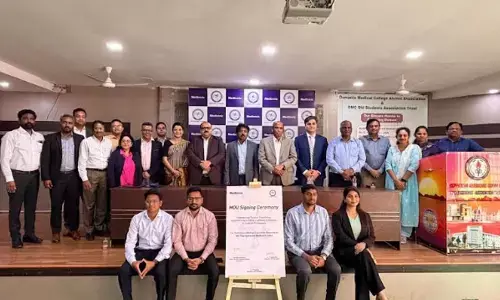Why frequent fainting spells can be fatal
 Why frequent fainting spells can be fatal
Why frequent fainting spells can be fatalFainting is a common phenomenon which has been experienced by everyone at some point in their lives. Since it is commonly believed to be caused by stress, inadequate sleep or eating an imbalanced diet among other factors, people tend to ignore it.
However, fainting can be fatal. It can cause an injury due to falling which can turn fatal, affecting a person for life. Apart from this, fainting can be a warning sign for a heart disorder. It can signal arrhythmias caused by abnormal beating of the heart, leading to serious medical emergencies like cardiac arrest and stroke.
Fainting is called syncope in medical terms and is defined as a temporary loss of consciousness caused due to insufficient flow of blood to the brain. This occurs when the heart stops pumping enough oxygen into the brain resulting in low blood pressure. While syncope affects people across age groups, the causes differ depending on the age of the patient.
The warning signs of syncope include palpitations in the heart, reeling of the head, giddiness, weakness, loss of energy and shortness of breath. The risk associated with syncope increases with age.
While syncope may seem common, some are life threatening, especially fainting during exertion or without any warning signs. This is because it is related to heart damage or abnormal electrical system disorders that affect the heart's ability to pump blood efficiently. In certain cases, it is the only warning sign for arrhythmia which can result in death.
Contrary to popular belief, that fainting always occurs due to neurological causes, the real cause often is cardiac in nature. Often blackouts happen due to syncope rather than epileptic seizures. This is because many syncopal attacks are characterized by symptoms such as random jerking of limbs, like those experienced during an epileptic seizure.
Post visiting the orthopedic expert, Sameer was referred to a cardiologist. He was put under observation on a Holter monitor for continuous ECG monitoring and was found to have a pause of 28 seconds which was life threatening and Atrial Fibrillation (an abnormal heart rhythm, which happens when electrical impulses fire from the atria, or the top chambers of the heart in a disorganized way).
He was given a defibrillation shock for AF and returned to normal rhythm. A 28 second pause is a Class I indication for implanting a pacemaker. He was advised to take Anticoagulants as well to prevent stroke.
He was advised on implanting a DDDR pacemaker. DDDR is a dual-chamber rate-modulated pacemaker which can record both atrial and ventricular rates. In addition, it has a sensor that records demand for higher cardiac output and can adjust the heart rate accordingly. The patient is now doing fine post two years of undergoing the implantation.
Diagnosis of syncope is based on the patient's history of fainting. The common methodology is to conduct a physical examination and electrocardiography (ECG). Based on the results, a more comprehensive cardiac assessment maybe required to assess the severity of the problem.
On experiencing a syncopal episode or abruptly losing consciousness, the best thing to do is to lay the person flat on the ground, to help ensure blood flow for gaining consciousness. It is also important to keep the body hydrated and allow it time to get used to one position before moving into another.
Do not ignore any instance of fainting as it can be fatal and consult an expert immediately. Interventions are there. We just need to listen to our body and get help when needed.
Dr Calambur Narasimhan
Director-Arrhythmia and Electrophysiology Services, CARE Hospital, Hyderabad

















